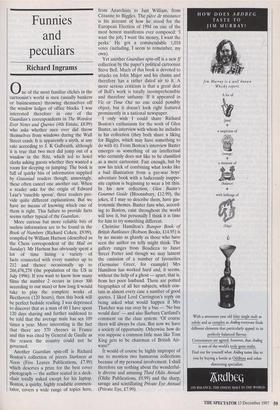Funnies and peculiars
Richard Ingrams
0 ne of the most familiar clichés in the cartoonist's world is men (usually bankers or businessmen) throwing themselves off the window ledges of office blocks. I was interested therefore in one of the Guardian's correspondents in The Weirdest Ever Notes and Queries (4th Estate, £8.99) who asks whether men ever did throw themselves from windows during the Wall Street crash. It is apparently a myth, at any rate according to J. K Galbraith, although it is true that two men did jump out of a window in the Ritz, which led to hotel clerks asking guests whether they wanted a room for sleeping or jumping. The book is full of quirky bits of information supplied by Grauniad readers though, annoyingly, these often cancel one another out. When a reader asks for the origin of Edward Lear's `runcible spoon', three readers pro- vide quite different explanations. But we have no means of knowing which one of them is right. This failure to provide facts seems rather typical of the Guardian.
More curious but more reliable bits of useless information are to be found in the Book of Numbers (Richard Cohen, £9.99), compiled by William Hartson (described as the Chess correspondent of the Mail on Sunday). Mr Hartson has obviously spent a lot of time listing a variety of facts connected with every number up to 212 and thence occasionally up to 266,476,278 (the population of the US in July 1996). If you want to know how many films the number 2 occurs in (over 300 according to our man) or how long it would take to play the complete works of Beethoven (120 hours), then this book will be perfect bedside reading. I was depressed to discover that as a man of 60 I have spent 120 days shaving and further saddened to be told that the average male has sex 109 times a year. More interesting is the fact that there are 370 cheeses in France and this was cited by General de Gaulle as the reason the country could not be governed.
Another Guardian spin-off is Richard Boston's collection of pieces Starkness at Noon (Five Leaves Publications, £7.99) which deserves a prize for the best cover photograph — the author seated in a deck- chair totally naked except for his laptop. Boston, a quirky, highly readable commen- tator, covers a wide range of topics here, from Anarchists to Just William, from Cezanne to Biggles. The piece de resistance is his account of how he stood for the European Election of 1994 on one of the most honest manifestos ever composed: 'I want the job, I want the money, I want the perks.' He got a commendable 1.018 votes (including, I seem to remember, my own).
Yet another Guardian spin-off is a new If collection by the paper's political cartoonist Steve Bell. Much of this book is devoted to attacks on John Major and his chums and therefore has a rather dated air to it. A more serious criticism is that a great deal of Bell's work is totally incomprehensible and therefore unfunny. If it appeared in Viz or Time Out no one could possibly object, but it doesn't look right featured prominently in a national newspaper.
I only wish I could share Richard Boston's enthusiasm for the work of Glen Baxter, an interview with whom he includes in his collection (they both share a liking for Biggles, which may have something to do with it). From Boston's interview Baxter emerges as something of an intellectual who certainly does not like to be classified as a mere cartoonist. Fair enough, but by now his trick of combining what looks like a bad illustration from a pre-war boys' adventure book with a ludicrously inappo- site caption is beginning to wear a bit thin. In his new collection, Glen Baxter's Gourmet Guide (Bloomsbury, £12.99), the jokes, if I may so describe them, have gas- tronomic themes. Baxter fans who, accord- ing to Boston, exist throughout the world will love it, but personally I think it is time for him to try something different.
Christine Hamilton's Bumper Book of British Battleaxes (Robson Books, £14.95) is by no means as ghastly as those who have seen the author on telly might think. The gallery ranges from Boadicea to Janet Street Porter and though we may lament the omission of a number of favourites (Germaine Greer, for example) Mrs Hamilton has worked hard and, it seems, without the help of a ghost — apart, that is, from her poor husband. There are potted biographies of all her subjects, which con- tain in almost every case a number of good quotes. I liked Lord Carrington's reply on being asked what would happen if Mrs Thatcher was ruin over by a bus — 'No bus would dare' — and also Barbara Cartland's comment on the class system: 'Of course there will always be class. But now we have a society of opportunity. Otherwise how do you suppose a common little man like Tom King gets to be chairman of British Air- ways?'
It would of course be highly improper of me to mention two humorous collections because of my personal involvement. I shall therefore say nothing about the wonderful- ly diverse and amusing Third Oldie Annual (Oldie Publications, £9.99) and the sharp, savage and scintillating Private Eye Annual (Private Eye, £7.99).


















































































 Previous page
Previous page